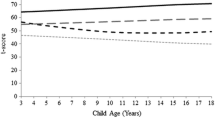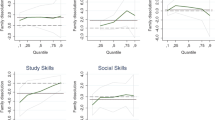Abstract
Behavior problems were investigated in 342 6- to 18-year-old children adopted from psychosocially depriving Russian institutions that provided adequate physical resources but not consistent, responsive caregiving. Results indicated that attention and externalizing problems were the most prevalent types of behavior problems in the sample as a whole. Behavior problem rates increased with age at adoption, such that children adopted at 18 months or older had higher rates than never-institutionalized children but younger-adopted children did not. There was a stronger association between age at adoption and behavior problems during adolescence than at younger ages at assessment. Children adopted from psychosocially depriving institutions had lower behavior problem rates than children adopted from severely depriving Romanian institutions in the 1990s. The implications of these results are that early psychosocial deprivation is associated with behavior problems, children exposed to prolonged early deprivation may be especially vulnerable to the developmental stresses of adolescence, and severe institutional deprivation is associated with a higher percentage of behavior problems after a shorter duration of exposure.


Similar content being viewed by others
References
Achenbach, T. M. (1991). Manual for the child behavior checklist/4–18 and 1991 profile. Burlington: University of Vermont, Department of Psychiatry.
Achenbach, T. M., & Rescorla, L. A. (2001). Manual for the ASEBA school-age forms and profiles. Burlington: University of Vermont, Research Center for Children, Youth, and Families.
Ainsworth, M. D. M., Blehar, M. C., Waters, E., & Wall, S. (1978). Patterns of attachment. Hillsdale: Erlbaum.
Berlin, L., Bohlin, G., & Rydell, A. (2003). Relations between inhibition, executive functioning, and ADHD symptoms: a longitudinal study from age 5 to 8 1/2 years. Child Neuropsychology, 9, 255–266.
Bornstein, M. H., & Tamis-LeMonda, C. S. (1989). Maternal responsiveness and cognitive development in children. In M. H. Bornstein (Ed.), Maternal responsiveness: Characteristics and consequences (pp. 49–61). San Francisco: Jossey-Bass.
Bruce, J., Tarullo, A. R., & Gunnar, M. R. (2009). Disinhibited social behavior among internationally adopted children. Development and Psychpathology, 21, 157–171.
Chisholm, K. (1998). A three year follow-up of attachment and indiscriminate friendliness in children adopted from Romanian orphanages. Child Development, 69, 1092–1106.
Colvert, E., Rutter, M., Beckett, C., Castle, J., Groothues, C., Hawkins, A., et al. (2008). The delayed onset of emotional difficulties following severe early deprivation: findings from the ERA study. Development and Psychopathology, 20, 547–567.
Crijnen, A., Achenbach, T., & Verhulst, F. (1999). Problems reported by parents of children in multiple cultures: the CBCL syndrome constructs. American Journal of Psychiatry, 156, 569–574.
Cummings, E. M., Davies, P. T., & Campbell, S. B. (2000). Developmental psychopathology and family process. New York: Guilford.
Duarte, C. S., Bordin, I. A. S., de Oliveira, A., & Bird, H. (2003). The CBCL and the identification of children with autism and related conditions in Brazil: pilot findings. Journal of Autism and Developmental Disorders, 33(6), 703–707.
Groza, V., & Ryan, S. D. (2002). Pre-adoption stress and its association with child behavior in domestic special needs and international adoptions. Psychoneuroendocrinology, 27(1/2), 181–198.
Gunnar, M. R. (2001). Effects of early deprivation: Findings from orphanage-reared infants and children. In C. A. Nelson & M. Luciana (Eds.), Handbook of developmental cognitive neuroscience (pp. 617–629). Cambridge: MIT.
Gunnar, M. R., van Dulmen, M. H. M., & Team, I. A. P. (2007). Behavior problems in post-institutionalized internationally adopted children. Development and Psychopathology, 19, 129–148.
Hodges, J., & Tizard, B. (1989). Social and family relationships of ex-institutional adolescents. Journal of Child Psychology and Psychiatry and Allied Disciplines, 30, 77–97.
Hoksbergen, R., Rijk, K., van Dijkum, C., & ter Laak, J. (2004). Adoption of Romanian children in the Netherlands: behavior problems and parenting burden of upbringing for adoptive parents. Developmental and Behavioral Pediatrics, 25(3), 175–180.
Juffer, F., & van IJzendoorn, M. H. (2005). Behavior problems and mental health referrals of international adoptees: a meta-analysis. Journal of the American Medical Association, 293(20), 2501–2515.
Kochanska, G., Murray, K. T., & Harlan, E. T. (2000). Effortful control in early childhood: continuity and change, antecedents, and implications for social development. Developmental Psychology, 36, 220–232.
Kossover, R. (2004). Analysis of dietary composition and nutritional adequacy in Russian orphans living in Baby Home No 13. Unpublished manuscript. Minneapolis: University of Minnesota.
Kreppner, J. M., O’Connor, T. G., & Rutter, M. (2001). Can inattention/overactivity be an institutional deprivation syndrome? Journal of Abnormal Child Psychology, 29, 513–528.
Kreppner, J. M., Rutter, M., Beckett, C., Castle, J., Colvert, E., Groothues, C., et al. (2007). Normality and impairment following profound early institutional deprivation: a longitudinal follow-up into early adolescence. Developmental Psychology, 43(4), 931–946.
Landry, S. H., Smith, K. E., & Swank, P. R. (2006). Responsive parenting: establishing early foundations for social, communication, and independent problem-solving skills. Developmental Psychology, 42(4), 627–642.
Le Mare, L., & Audet, K. (2002). Attention abilities of Romanian orphans ten years after being adopted to Canada. Poster presented at the International Society for the Study of Behavioral Development, Ottawa, Ontario. (August 2–5)
MacLean, K. (2003). The impact of institutionalization on child development. Development and Psychopathology, 15, 853–884.
Miller, L., Chan, W., Tirella, L., & Perrin, E. (2009). Outcomes of children adopted from Eastern Europe. International Journal of Behavioral Development, 33(4), 289–298.
Muhamedrahimov, R. J. (1999). New attitudes: Infant care facilities in St. Petersburg, Russia. In J. D. Osofsky & H. E. Fitzgerald (Eds.), WAIMH handbook of infant mental health. Perspectives on infant mental health (Vol. 1, pp. 245–294). New York: Wiley.
Nelson, C. A., III, Zeanah, C. H., & Fox, N. A. (2007). The effects of early deprivation on brain-behavioral development: The Bucharest Early Intervention Project. In D. Romer & E. F. Walker (Eds.), Adolescent psychopathology and the developing brain: Integrating brain and prevention science (pp. 197–217). New York: Oxford.
Olson, S. L., Bates, J. E., Sandy, J. M., & Schilling, E. M. (2002). Early developmental precursors of impulsive and inattentive behavior: from infancy to middle childhood. Journal of Child Psychology and Psychiatry, 43, 435–447.
Pollak, S. D., Nelson, C. A., Schlaak, M. F., Roeber, B. J., Wewerka, S. S., Wiik, K. L. et al. (2009). Neurodevelopmental effects of early deprivation in post-institutionalized children. Child Development.
Rutter, M., Andersen-Wood, L., Beckett, C., Bredenkamp, D., Castle, J., Groothues, C., et al. (1999). Quasi-autistic patterns following severe early global privation. Journal of Child Psychology and Psychiatry, 40, 537–549.
Rutter, M., Kreppner, J. M., & O’Connor, T. G. (2001). Specificity and heterogeneity in children’s responses to profound institutional privation. British Journal of Psychiatry, 179, 97–103.
Rutter, M., Beckett, C., Castle, J., Colvert, E., Kreppner, J., Mehta, M., et al. (2007). Effects of profound early institutional deprivation: an overview of findings from a UK longitudinal study of Romanian adoptees. European Journal of Developmental Psychology, 4(3), 332–350.
Sonuga-Barke, E. J. S., Beckett, C., Kreppner, J., Castle, J., Colvert, E., Stevens, S., et al. (2008). Is sub-nutrition necessary for a poor outcome following early institutional deprivation? Developmental Medicine & Child Neurology, 50(9), 664–71.
Sparling, J., Dragomir, C., Ramey, S. L., & Florescu, L. (2005). An educational intervention improves developmental progress of young children in a Romanian orphanage. Infant Mental Health Journal, 26(2), 127–42.
Steinberg, L., Dahl, R., Keating, D., Kupfer, D. J., Masten, A. S., & Pine, D. (2006). The study of developmental psychopathology in adolescence: Integrating affective neuroscience with the study of context. In D. Cicchetti & D. Cohen (Eds.), Developmental psychopathology (2nd ed., pp. 710–741). New York: Wiley.
Stevens, S. E., Sonuga-Barke, E. S., Kreppner, J. M., Beckett, C., Castle, J., Colvert, E., et al. (2007). Inattention/overactivity following early severe institutional deprivation: presentation and associations in early adolescence. Journal of Abnormal Child Psychology, 36, 385–398.
Tarullo, A. R., Bruce, J., & Gunnar, M. R. (2007). False belief and emotion understanding in post-institutionalized children. Social Development, 16(1), 57–78.
The St. Petersburg–USA Orphanage Research Team. (2005). Characteristics of children, caregivers, and orphanages for young children in St. Petersburg, Russian Federation. Journal of Applied Developmental Psychology: Child Abandonment, 26, 477–506. Special Issue.
The St. Petersburg–USA Orphanage Research Team. (2008). The effects of early social-emotional and relationship experience on the development of young orphanage children. Monograph of the Society for Research in Child Development, 73, Serial No. 291(3).
Tizard, B., & Hodges, J. (1978). The effect of early institutional rearing on the development of eight-year-old children. Journal of Child Psychology and Psychiatry and Allied Disciplines, 19, 99–118.
Tizard, J., & Tizard, B. (1971). The social development of two-year-old children in residential nurseries. In H. R. Schaffer (Ed.), The origins of human social relations (pp. 147–163). New York: Academic.
US State Dept. (2006). Online at http://travel.state.gov/family/adoption/stats/stats_451.html.
Verhulst, F. C., & Versluis-den Bieman, H. J. (1995). Developmental course of problem behaviors in adolescent adoptees. Journal of the American Academy of Child and Adolescent Psychiatry, 34, 151–159.
Zeanah, C. H., Egger, H. L., Smyke, A. T., Nelson, C. A., Fox, N. A., Marshall, P. J., et al. (2009). Institutional rearing and psychiatric disorders in Romanian preschool children. American Journal of Psychiatry, 166(7), 777–785.
Acknowledgments
This research was supported by NICHD grants HD39017 and HD050212 to Robert B. McCall and Christina J. Groark. The content is solely the responsibility of the authors and does not necessarily represent the official views of the NICHD or NIH. The authors thank Larisa Mason, Mary Graber, and the participating families who made this study possible. The authors are also grateful to Megan Gunnar and Victor Groza for contributing data and for their helpful comments on an earlier version of this manuscript. The authors also thank Larry Fish for guidance with statistical analyses and Johana Rosas, Megan Julian, and Brandi Hawk for their assistance with the database.
Author information
Authors and Affiliations
Corresponding author
Rights and permissions
About this article
Cite this article
Merz, E.C., McCall, R.B. Behavior Problems in Children Adopted from Psychosocially Depriving Institutions. J Abnorm Child Psychol 38, 459–470 (2010). https://doi.org/10.1007/s10802-009-9383-4
Published:
Issue Date:
DOI: https://doi.org/10.1007/s10802-009-9383-4




